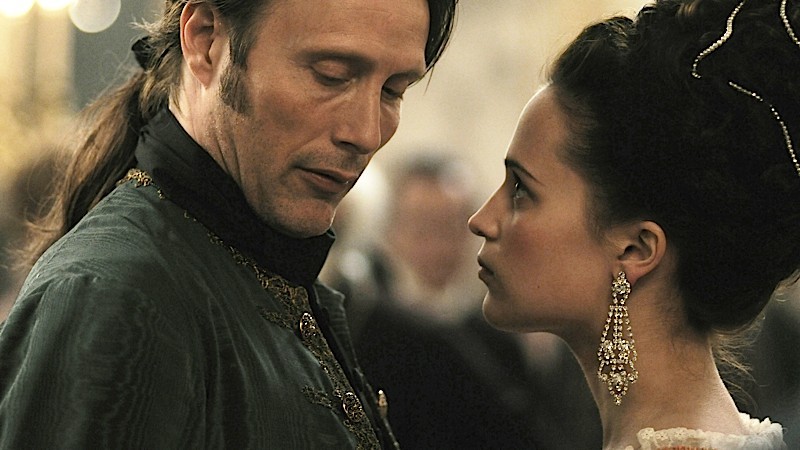Though A Royal Affair is his first directorial outing to receive much of a push in the UK, chances are more discerning cinemagoers will have crossed paths with Denmark's Nicolaj Arcel at some point in the none-too-distant past. His third film as director, the political drama King's Game, had a brief theatrical run in 2005; more recently, he wrote the screenplay for the first big-screen version of Stieg Larsson's The Girl with the Dragon Tattoo. Arcel's latest, an 18th century-set love triangle, has something of Bertrand Tavernier's period pieces (including last year's The Princess of Montpensier) about it: it describes a pivotal historical moment in very modern, non-stuffy terms, the better to point up how far (or little) we've travelled in the meantime.
His heroine, Caroline, was the prize catch of the late 1760s, a princess blessed with smarts and sensitivity, and - as incarnated here by Alicia Vikander - beauty enough to illuminate that part of the continent not as yet feeling the benefits of the Enlightenment. Marriage to the reportedly cultured King Christian VII sounded like a dream, but that dream came quickly to sour: the books the young Caroline had accumulated during her European studies were confiscated under Danish censorship laws, and the King himself (Mikkel Boe Følsgaard) turned out to be no more than a spoilt child, gauche and gangling, and rather keener to exercise his authority over the residents of Copenhagen's whorehouses than he was to make love to his new bride. Enter Dr. Johan Struensee (Mads Mikkelsen), radical son of a conservative German cleric, who arrived to fill the post of the King's personal physician, bringing with him whole shelves' worth of Rousseau and Diderot. While prodding and provoking the King into a healthier state of mind, he was sensitive enough to spot his young Queen wasn't exactly being well-served - physically, emotionally, intellectually - by her ruler; that, if men were born free and everywhere in shackles, then certain women, too, might well need to be liberated from the bonds that tied them.
These days, you're lucky if you get one character in a movie this compelling; Arcel - adapting Bodil Steensen-Leth's novel Prinsesse af blodet - has written three, which means there's always someone on screen to marvel at, and more so the more of them are together. The acting honours at this year's Berlin film festival went, surprisingly, not to the better-known Mikkelsen, playing a talisman of free-thinking, but to the previously unknown Følsgaard: in part, no doubt, for his spirited embodiment of weak-chinned privilege, but also perhaps because it's the King who's seen to change the most over the course of the film. Spruensee was apparently as interested in making Christian improve himself and the lives of his subjects - nudging the boy-King into standing up at Council meetings, to address the poverty and filth blighting the capital's streets - as he was in slipping his key into the Queen's lock; he may have also realised the advantage of involving the ruler in courtly matters was, of course, that it removed him from his wife for longer stretches.
The backdrop to this filigreed interpersonal business comprises a broader, grander vision yet: that of a Denmark governed more by suspicion than love, where excessive punishment awaits even the most minor of indiscretions. One glance at the "wooden horse" upon which masters would torture and break reluctant serfs, and you immediately realise what the progressive doctor and the nurturing Queen were up against. If you like, A Royal Affair forms a backstory for everything you've seen on BBC4 on recent Saturday nights, laying out, in sumptuous, intelligent fashion, something of the personal sacrifices required to arrive at the state of openness and liberalism new Scandinavian dramas like Wallander and The Bridge have busied themselves interrogating.
Though much will be made of Spruensee's status as a foreigner when public opinion finally starts to turn on the adulterers, Arcel equally isn't blind to the irony that it was this notionally liberal figure who encouraged his King to reinstate censorship when rumours about the paternity of Caroline's second child - destined to become the tolerant King Frederik VI - began to circulate. This is a costume drama where the characters aren't just rearranging the cutlery; they're changing the fate of an entire nation with their thoughts, words and deeds. We already knew the Danish were making better thrillers than the Americans, and we've seen them playing more effective football than the Dutch, but there was nothing to suggest they'd also end up producing more seductive period films than we Brits. Geez, why don't you just take over the universe, Denmark?
A Royal Affair opens in selected cinemas from tomorrow.

I agree wholeheartedly with this review! I had absolutely no expectations before seeing A Royal Affair, and I was very pleasantly surprised. It has the level of substance and of political and idealogical depth that comparable period films such as Young Victoria are sadly lacking. Like you say Mike, the Danes are winning!
ReplyDeleteHi Emma,
DeleteLong time no speak! Many thanks for taking the time to reply - glad you agree, and more importantly, glad you engaged with the film. If you're of a mind to see more high-quality Danish drama, I can thoroughly recommend the contemporary thriller "A Hijacking", which opens in the UK tomorrow, and may be working its way around Europe.
Hope Germany's treating you well,
M x